477 start with D start with D


On April 20, 2010, the crew of the floating drill rig Deepwater Horizon lost control of the Macondo oil well forty miles offshore in the Gulf of Mexico. Escaping gas and oil ignited, destroying the rig, killing eleven crew members, and injuring dozens more. The emergency spiraled into the worst human-made economic and ecological disaster in Gulf Coast history.
Senior systems engineers Earl Boebert and James Blossom offer the most comprehensive account to date of BP’s Deepwater Horizon oil spill. Sifting through a mountain of evidence generated by the largest civil trial in U.S. history, the authors challenge the commonly accepted explanation that the crew, operating under pressure to cut costs, made mistakes that were compounded by the failure of a key safety device. This explanation arose from legal, political, and public relations maneuvering over the billions of dollars in damages that were ultimately paid to compensate individuals and local businesses and repair the environment. But as this book makes clear, the blowout emerged from corporate and engineering decisions which, while individually innocuous, combined to create the disaster.
Rather than focusing on blame, Boebert and Blossom use the complex interactions of technology, people, and procedures involved in the high-consequence enterprise of offshore drilling to illustrate a systems approach which contributes to a better understanding of how similar disasters emerge and how they can be prevented.
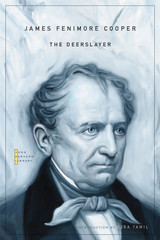
Though The Deerslayer (1841) was the last of Cooper’s five Leather-stocking tales to be written, it is the first in the chronology of Natty Bumppo’s life. Set in the 1740s before the start of the French and Indian War, when Cooper’s rugged frontiersman is in his twenties, Cooper’s novel shows us how “Deerslayer” becomes “Hawkeye.” It remains the best point of entry into the series for modern readers.
In his introduction, Ezra Tawil examines Cooper’s motivations in writing The Deerslayer, the static nature of Natty, and Cooper’s vexed racial politics. The John Harvard Library edition reproduces the authoritative text of The Deerslayer in The Writings of James Fenimore Cooper (State University of New York Press).
Since 1959 The John Harvard Library has been instrumental in publishing essential American writings in authoritative editions.


Anthony Grafton is erudite and elegant in the style of the best historical writers who make the past come alive for the reader. In a full-scale presentation of the world of scholarship, from the Renaissance to the modern period, Grafton sets before us in three-dimensional detail such seminal figures as Poliziano, Scaliger, Kepler, and Wolf. He calls attention to continuities, moments of crisis, and changes in direction.
The central issue in Defenders of the Text is the relation between humanism and science from the mid-fifteenth century to the beginning of the modern period. Treatments of Renaissance humanism in English have emphasized the humanists’ commitment to rhetoric, ethics, and politics and have accused the humanists of concentrating on literary matters in preference to investigating the real world via new developments in science, philosophy, and other technical disciplines. This revisionist book demonstrates that humanism was neither a simple nor an impractical enterprise, but worked hand-in-hand with science in developing modern learning.
Grafton makes clear that humanism remained an integral and vital part of European culture until the eighteenth century, maintaining a technical component of its own—classical philology—which developed in as rich, varied, and unexpected a way as any other field of European thought. Attention to the text led the humanists to develop a whole range of cools and methods that lent power to science and learning for centuries to come. Grafton shows the continued capacity of classical texts to provoke innovative work in both philology and philosophy, and traces a number of close and important connections between humanism and natural science. His book will be important to intellectual historians, students of the classics and the classical tradition, and historians of early modern science.

Although it is often charged with hostility toward religion, First Amendment doctrine in fact treats religion as a distinctive human good. It insists, however, that this good be understood abstractly, without the state taking sides on any theological question. Here, a leading scholar of constitutional law explains the logic of this uniquely American form of neutrality—more religion-centered than liberal theorists propose, and less overtly theistic than conservatives advocate.
The First Amendment’s guarantee of freedom of religion is under threat. Growing numbers of critics, including a near-majority of the Supreme Court, seem ready to cast aside the ideal of American religious neutrality. Andrew Koppelman defends that ideal and explains why protecting religion from political manipulation is imperative in an America of growing religious diversity.
Understanding American religious neutrality, Koppelman shows, can explain some familiar puzzles. How can Bible reading in public schools be impermissible while legislative sessions begin with prayers, Christmas is an official holiday, and the words “under God” appear in the Pledge of Allegiance? Are faith-based social services, public financing of religious schools, or the teaching of intelligent design constitutional? Combining legal, historical, and philosophical analysis, Koppelman shows how law coherently navigates these conundrums. He explains why laws must have a secular legislative purpose, why old, but not new, ceremonial acknowledgments of religion are permitted, and why it is fair to give religion special treatment.

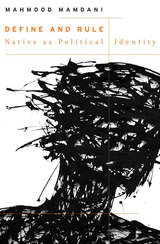
Define and Rule focuses on the turn in late nineteenth-century colonial statecraft when Britain abandoned the attempt to eradicate difference between conqueror and conquered and introduced a new idea of governance, as the definition and management of difference. Mahmood Mamdani explores how lines were drawn between settler and native as distinct political identities, and between natives according to tribe. Out of that colonial experience issued a modern language of pluralism and difference.
A mid-nineteenth-century crisis of empire attracted the attention of British intellectuals and led to a reconception of the colonial mission, and to reforms in India, British Malaya, and the Dutch East Indies. The new politics, inspired by Sir Henry Maine, established that natives were bound by geography and custom, rather than history and law, and made this the basis of administrative practice.
Maine’s theories were later translated into “native administration” in the African colonies. Mamdani takes the case of Sudan to demonstrate how colonial law established tribal identity as the basis for determining access to land and political power, and follows this law’s legacy to contemporary Darfur. He considers the intellectual and political dimensions of African movements toward decolonization by focusing on two key figures: the Nigerian historian Yusuf Bala Usman, who argued for an alternative to colonial historiography, and Tanzania’s first president, Mwalimu Julius Nyerere, who realized that colonialism’s political logic was legal and administrative, not military, and could be dismantled through nonviolent reforms.

The 1890s was an exciting time in American biology, a time of great intellectual debate and turmoil. Much of this activity centered on the now-famous Evening Lectures delivered at the Woods Hole Marine Biological Laboratory on Cape Cod, where leading biologists gathered to research the leading issues of the day. There was no better way to learn about what was being discussed and debated at the cutting edge of biology than through the Evening Lectures. The lectures of outstanding scientists such as C. 0. Whitman, E. B. Wilson, E. G. Conklin, J. Loeb, and T. H. Morgan redefined our thinking about biology.
These Evening Lectures stimulated major biological revolutions: the conversion of embryology to an independent discipline; the beginnings of ethology; the rise of genetics and especially cytogenetics; and the application of chemistry and physics to cell function-the birth of what is now called cell biology. Some of the central problems that scientists still puzzle over were first proposed at Woods Hole.
Not only are these lectures important scientific accomplishments, they also provide an invaluable record of the beginnings of a truly American school of biology. Printed in a limited edition, they have remained inaccessible to many people interested in knowing more about the meteoric rise of American biology. Jane Maienschein has selected key lectures, written an introductory essay, and provided brief explanations of the significance and impact of each lecture. Ernst Mayr, distinguished biologist and historian, has added a Foreword about the intellectual importance of the lectures to the formation of American biology; and Paul Gross, present Director of the Marine Biological Laboratory, has contributed an Epilogue that conveys the excitement and later significance of the 1890s.

Presenting fresh insights on the internal dynamics and global contexts that shaped foreign relations in early modern Japan, Robert I. Hellyer challenges the still largely accepted wisdom that the Tokugawa shogunate, guided by an ideology of seclusion, stifled intercourse with the outside world, especially in the eighteenth and nineteenth centuries.
Examining diplomacy, coastal defense, and foreign trade, this study demonstrates that while the shogunate created the broader framework, foreign relations were actually implemented through cooperative but sometimes competitive relationships with the Satsuma and Tsushima domains, which themselves held largely independent ties with neighboring states. Successive Tokugawa leaders also proactively revised foreign trade, especially with China, taking steps that mirrored the commercial stances of other Asian and Western states.
In the nineteenth century, the system of foreign relations continued to evolve, with Satsuma gaining a greater share of foreign trade and Tsushima assuming more responsibility in coastal defense. The two domains subsequently played key roles in Japan’s transition from using early modern East Asian practices of foreign relations to the national adoption of international relations, especially the recasting of foreign trade and the centralization of foreign relations authority, in the years surrounding the Meiji Restoration of 1868.

In a unique blend of political, intellectual, and cultural history, Brian Vick explores the world of German nationalism during the first half of the nineteenth century. Vick first presents an original investigation of German conceptions of nationhood in these decades before moving on to analyze the efforts of deputies at the Frankfurt Constituent National Assembly to construct a German national state based on the ethnically diverse German Confederation. He examines debates over fundamental issues that included citizenship qualifications, minority linguistic rights, Jewish emancipation, and territorial disputes, and offers valuable insights into nineteenth-century liberal opinion on the Jewish Question, language policy, and ideas of race.
Contrary to the often invoked dichotomy between cultural and political types of nationalism, in which the German case is usually seen as prototypical of the xenophobic, exclusionary cultural form, this study reveals how German nationalists at Frankfurt interwove cultural and political strands of the national ideal so finely as to sanction equal citizenship status in the proposed state for both the German-Jewish minority and the non-German-speaking nationalities within its boundaries. Yet deputies also contentiously defined Germany's borders so as to incorporate the latter, often unwilling groups, thereby hoping to dominate them both culturally and politically. Conflict was thus as much a part of this "culture of nationhood" as inclusion.

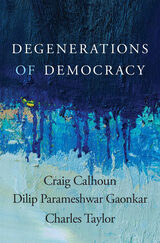
Three leading thinkers analyze the erosion of democracy’s social foundations and call for a movement to reduce inequality, strengthen inclusive solidarity, empower citizens, and reclaim pursuit of the public good.
Democracy is in trouble. Populism is a common scapegoat but not the root cause. More basic are social and economic transformations eroding the foundations of democracy, ruling elites trying to lock in their own privilege, and cultural perversions like making individualistic freedom the enemy of democracy’s other crucial ideals of equality and solidarity. In Degenerations of Democracy three of our most prominent intellectuals investigate democracy gone awry, locate our points of fracture, and suggest paths to democratic renewal.
In Charles Taylor’s phrase, democracy is a process, not an end state. Taylor documents creeping disempowerment of citizens, failures of inclusion, and widespread efforts to suppress democratic participation, and he calls for renewing community. Craig Calhoun explores the impact of disruption, inequality, and transformation in democracy’s social foundations. He reminds us that democracies depend on republican constitutions as well as popular will, and that solidarity and voice must be achieved at large scales as well as locally.
Taylor and Calhoun together examine how ideals like meritocracy and authenticity have become problems for equality and solidarity, the need for stronger articulation of the idea of public good, and the challenges of thinking big without always thinking centralization.
Dilip Parameshwar Gaonkar points out that even well-designed institutions will not integrate everyone, and inequality and precarity make matters worse. He calls for democracies to be prepared for violence and disorder at their margins—and to treat them with justice, not oppression.
The authors call for bold action building on projects like Black Lives Matter and the Green New Deal. Policy is not enough to save democracy; it will take movements.
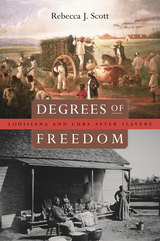
As Louisiana and Cuba emerged from slavery in the late nineteenth century, each faced the question of what rights former slaves could claim. Degrees of Freedom compares and contrasts these two societies in which slavery was destroyed by war, and citizenship was redefined through social and political upheaval. Both Louisiana and Cuba were rich in sugar plantations that depended on an enslaved labor force. After abolition, on both sides of the Gulf of Mexico, ordinary people—cane cutters and cigar workers, laundresses and labor organizers—forged alliances to protect and expand the freedoms they had won. But by the beginning of the twentieth century, Louisiana and Cuba diverged sharply in the meanings attributed to race and color in public life, and in the boundaries placed on citizenship.
Louisiana had taken the path of disenfranchisement and state-mandated racial segregation; Cuba had enacted universal manhood suffrage and had seen the emergence of a transracial conception of the nation. What might explain these differences?
Moving through the cane fields, small farms, and cities of Louisiana and Cuba, Rebecca Scott skillfully observes the people, places, legislation, and leadership that shaped how these societies adjusted to the abolition of slavery. The two distinctive worlds also come together, as Cuban exiles take refuge in New Orleans in the 1880s, and black soldiers from Louisiana garrison small towns in eastern Cuba during the 1899 U.S. military occupation.
Crafting her narrative from the words and deeds of the actors themselves, Scott brings to life the historical drama of race and citizenship in postemancipation societies.

Athenaeus (ca. 170ca. 230 CE), a Greek of Naucratis in Egypt, lived in Rome and wrote a historical work now lost. Of the fifteen books of his surviving Deipnosophists ('Sophists at Dinner'), the first two and parts of the third, eleventh, and fifteenth exist only in summary, the rest apparently complete. In it he pretends to tell a friend about a banquet at a scholar's house whither the learned guests brought extracts from poetry for recitation and discussion. Much of the matter however concerns the food provided and accessories. One learns about cooks, strange dishes, wines, menu cards, and countless other matters. Athenaeus was an antiquarian. The whole work, which mentions nearly eight hundred writers and two thousand five hundred writings, is a large treasury of information not only about table matters but also music, dances, games, and all sorts of literary subjects. And it abounds in quotations, mostly made direct by Athenaeus himself, from authors whose writings have not survived.
The Loeb Classical Library edition of The Deipnosophists is in seven volumes. There is a comprehensive index in the final volume.

Athenaeus (ca. 170ca. 230 CE), a Greek of Naucratis in Egypt, lived in Rome and wrote a historical work now lost. Of the fifteen books of his surviving Deipnosophists ('Sophists at Dinner'), the first two and parts of the third, eleventh, and fifteenth exist only in summary, the rest apparently complete. In it he pretends to tell a friend about a banquet at a scholar's house whither the learned guests brought extracts from poetry for recitation and discussion. Much of the matter however concerns the food provided and accessories. One learns about cooks, strange dishes, wines, menu cards, and countless other matters. Athenaeus was an antiquarian. The whole work, which mentions nearly eight hundred writers and two thousand five hundred writings, is a large treasury of information not only about table matters but also music, dances, games, and all sorts of literary subjects. And it abounds in quotations, mostly made direct by Athenaeus himself, from authors whose writings have not survived.
The Loeb Classical Library edition of The Deipnosophists is in seven volumes. There is a comprehensive index in the final volume.

Athenaeus (ca. 170ca. 230 CE), a Greek of Naucratis in Egypt, lived in Rome and wrote a historical work now lost. Of the fifteen books of his surviving Deipnosophists ('Sophists at Dinner'), the first two and parts of the third, eleventh, and fifteenth exist only in summary, the rest apparently complete. In it he pretends to tell a friend about a banquet at a scholar's house whither the learned guests brought extracts from poetry for recitation and discussion. Much of the matter however concerns the food provided and accessories. One learns about cooks, strange dishes, wines, menu cards, and countless other matters. Athenaeus was an antiquarian. The whole work, which mentions nearly eight hundred writers and two thousand five hundred writings, is a large treasury of information not only about table matters but also music, dances, games, and all sorts of literary subjects. And it abounds in quotations, mostly made direct by Athenaeus himself, from authors whose writings have not survived.
The Loeb Classical Library edition of The Deipnosophists is in seven volumes. There is a comprehensive index in the final volume.

Athenaeus (ca. 170ca. 230 CE), a Greek of Naucratis in Egypt, lived in Rome and wrote a historical work now lost. Of the fifteen books of his surviving Deipnosophists ('Sophists at Dinner'), the first two and parts of the third, eleventh, and fifteenth exist only in summary, the rest apparently complete. In it he pretends to tell a friend about a banquet at a scholar's house whither the learned guests brought extracts from poetry for recitation and discussion. Much of the matter however concerns the food provided and accessories. One learns about cooks, strange dishes, wines, menu cards, and countless other matters. Athenaeus was an antiquarian. The whole work, which mentions nearly eight hundred writers and two thousand five hundred writings, is a large treasury of information not only about table matters but also music, dances, games, and all sorts of literary subjects. And it abounds in quotations, mostly made direct by Athenaeus himself, from authors whose writings have not survived.
The Loeb Classical Library edition of The Deipnosophists is in seven volumes. There is a comprehensive index in the final volume.

Athenaeus (ca. 170ca. 230 CE), a Greek of Naucratis in Egypt, lived in Rome and wrote a historical work now lost. Of the fifteen books of his surviving Deipnosophists ('Sophists at Dinner'), the first two and parts of the third, eleventh, and fifteenth exist only in summary, the rest apparently complete. In it he pretends to tell a friend about a banquet at a scholar's house whither the learned guests brought extracts from poetry for recitation and discussion. Much of the matter however concerns the food provided and accessories. One learns about cooks, strange dishes, wines, menu cards, and countless other matters. Athenaeus was an antiquarian. The whole work, which mentions nearly eight hundred writers and two thousand five hundred writings, is a large treasury of information not only about table matters but also music, dances, games, and all sorts of literary subjects. And it abounds in quotations, mostly made direct by Athenaeus himself, from authors whose writings have not survived.
The Loeb Classical Library edition of The Deipnosophists is in seven volumes. There is a comprehensive index in the final volume.

W. T. Lhamon 's Deliberate Speed is a cultural history of the 1950s in the United States that directly confronts the typical view of this decade as an arid wasteland. By surveying the artistic terrain of the period--examining works by figures as varied as Miles Davis, Ralph Ellison, Robert Frank, Allen Ginsberg, Little Richard, Charlie Parker, Jackson Pollock, Thomas Pynchon, and Ludwig Wittgenstein--Lhamon demonstrates how many of the distinctive elements that so many attribute to the revolutionary period of the 1960s had their roots in the fertile soil of the 1950s.
Taking his title from Chief Justice Earl Warren's desegregation decree of 1955, Lhamon shows how this phrase, "deliberate speed," resonates throughout the culture of the entire decade. The 1950s was a period of transition--a time when the United States began its shift from an industrial society to a postindustrial society, and the era when the first barriers between African-American culture and white culture began to come down.
Deliberate Speed is the story of a nation and a culture making the rapid transition to the increasingly complex world that we inhabit today.

Delinquency evaluates one of the largest longitudinal-observational studies of juvenile delinquents ever conducted. Utilizing a normal population sample and conducting individual interviews repeatedly over many years, the author and his colleagues followed the development of 400 British working-class boys from age eight to twenty-five, of whom one-third eventually had criminal records.
Five factors were found to predict most delinquent behavior, the most powerful statistically being the presence of a criminal parent. By measuring the accumulated pressure of these factors, D. J. West demonstrates the extent to which delinquency can be predicted from classroom observations or social background at an early age. He outlines policy guidelines that would tailor intervention to a youth's age and circumstances, and he argues persuasively that positive change in the parents' situation usually produces good effects on the children.

Throughout more than forty years of research into the causes, treatment, and prevention of delinquency and criminality Sheldon and Eleanor Glueck have put particular emphasis on the central importance of a continuing study of their subjects. This work incorporates data presented in Unraveling Juvenile Delinquency (HUP, 1950) with new data collected in over twelve years of subsequent investigation exploring the lives, into young adulthood, of the delinquents and of the carefully matched control group of nondelinquents who were studied in the earlier work.
By comparing the information detailing the domestic relations, work histories, recreational activities, careers in the armed forces, and other aspects of life of the young adults of both the delinquent and control groups, the Gluecks raise fundamental theoretical issues concerning delinquency prevention and crime control. The authors' research techniques are presented through an illustrative investigation, “The Case of Henry W.” The methods employed are designed to accumulate sufficient evidence to determine how the personalities and environmental backgrounds of law offenders relate to their behavior.
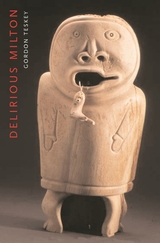

South Korea is home to one of the most vibrant evangelical Protestant communities in the world. This book investigates the meanings of—and the reasons behind—an intriguing aspect of contemporary South Korean evangelicalism: the intense involvement of middle-class women. Drawing upon extensive ethnographic fieldwork in Seoul that explores the relevance of gender and women’s experiences to Korean evangelicalism, Kelly H. Chong not only helps provide a clearer picture of the evangelical movement’s success in South Korea, but interrogates the global question of contemporary women’s attraction to religious traditionalisms.
In highlighting the growing disjunction between the forces of social transformation that are rapidly liberalizing modern Korean society, and a social system that continues to uphold key patriarchal structures on both societal and familial levels, Chong relates women’s religious involvement to the contradictions of South Korea’s recent socio-cultural changes and complex engagement with modernity. By focusing on the ways in which women’s religious participation constitutes—both spiritually and institutionally—an important part of their effort to negotiate the problems and dilemmas of contemporary family and gender relations, this book explores the contradictory significance of evangelical beliefs and practices for women, which simultaneously opens up possibilities for gender negotiation/resistance, and for women’s redomestication.


How does France reconcile the modern movement toward pluralism and decentralization with a strong central governing power? One of the country's most distinguished political historians offers a radical new interpretation of the development of democracy in France and the relationship between government and its citizens.
Since the publication of Tocqueville's Ancient Regime and the Revolution, French political structures have been viewed as the pure expression of a native Jacobinism, itself the continuation of an old absolutism. This interpretation has served as both a diagnosis of and an excuse for the inability to accept pluralism and decentralization as norms of a modern democracy, as evidenced in such policies as the persistence of the role of prefects and the ban on headscarves in schools.
Pierre Rosanvallon, by contrast, argues that the French have cherished and demonized Jacobinism at the same time; their hearts followed Robespierre, but their heads turned toward Benjamin Constant. The Demands of Liberty traces the long history of resistance to Jacobinism, including the creation of associations and unions and the implementation of elements of decentralization. Behind the ideological triumph of the state lies the conflicting creation of an active civil society.
In exploring these tensions, Rosanvallon takes the debate far beyond traditional views of liberalism versus republicanism and offers an innovative analysis of why the French system has worked despite Jacobinism.

Histories of remote islands around Japan are usually told through the prism of territorial disputes. In contrast, Takahiro Yamamoto contends that the transformation of the islands from ambiguous border zones to a territorialized space emerged out of multilateral power relations. Sakhalin, the Kuril Islands, Tsushima, the Bonin Islands, and the Ryukyu Islands became the subject of inter-imperial negotiations during the formative years of modern Japan as empires nudged each other to secure their status with minimal costs rather than fighting a territorial scramble. Based on multiarchival, multilingual research, Demarcating Japan argues that the transformation of border islands should be understood as an interconnected process, where inter-local referencing played a key role in the outcome: Japan’s geographical expansion in the face of domineering Extra-Asian empires.
Underneath this multilateral process were the connections forged by individuals. Translators, doctors, traffickers, castaways, and indigenous hunters crisscrossed border regions and enacted violence, exchanged knowledge, and forged friendships. Although their motivations were eclectic and their interactions transcended national borders, the linkages they created were essential in driving territorialization forward. Demarcating Japan demonstrates the crucial role of nonstate actors in formulating a territory.

Ancient scholarship had many faces, but most have faded away over time. Demetrios of Scepsis is one of the more shadowy of these lost figures, best known for his commentary on the Trojan Catalogue in Book 2 of the Iliad. Alexandra Trachsel’s work represents the first treatment dedicated to Demetrios of Scepsis in over a century. Because of the incomplete transmission of Demetrios’s work, Trachsel necessarily focuses on the way later readers understood the ancient author’s engagement with the Homeric text. Indeed, modern scholars have access to Demetrios’s analysis of the Trojan Catalogue only through their readings.
Trachsel’s work offers a thorough analysis of the ancient and modern reactions to Demetrios’s research into the Homeric text and the Trojan landscape, and it revisits the ongoing debate about the setting for Homer’s Trojan poem. Trachsel also provides new evidence about the impressively wide range of other topics Demetrios’s work may have contained.
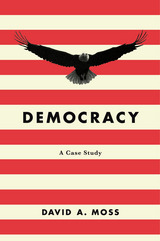
A Foreign Affairs Best Book of the Year
“This absolutely splendid book is a triumph on every level. A first-rate history of the United States, it is beautifully written, deeply researched, and filled with entertaining stories. For anyone who wants to see our democracy flourish, this is the book to read.”
—Doris Kearns Goodwin
To all who say our democracy is broken—riven by partisanship, undermined by extremism, corrupted by wealth—history offers hope. Democracy’s nineteen cases, honed in David Moss’s popular course at Harvard and taught at the Library of Congress, in state capitols, and at hundreds of high schools across the country, take us from Alexander Hamilton’s debates in the run up to the Constitutional Convention to Citizens United. Each one presents a pivotal moment in U.S. history and raises questions facing key decision makers at the time: Should the delegates support Madison’s proposal for a congressional veto over state laws? Should Lincoln resupply Fort Sumter? Should Florida lawmakers approve or reject the Equal Rights Amendment? Should corporations have a right to free speech? Moss invites us to engage in the passionate debates that are crucial to a healthy society.
“Engagingly written, well researched, rich in content and context…Moss believes that fierce political conflicts can be constructive if they are mediated by shared ideals.”
—Glenn C. Altschuler, Huffington Post
“Gives us the facts of key controversies in our history—from the adoption of the constitution to Citizens United—and invites readers to decide for themselves…A valuable resource for civic education.”
—Michael Sandel, author of Justice

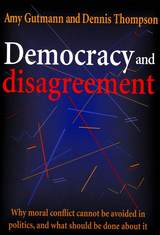
The din and deadlock of public life in America—where insults are traded, slogans proclaimed, and self-serving deals made and unmade—reveal the deep disagreement that pervades our democracy. The disagreement is not only political but also moral, as citizens and their representatives increasingly take extreme and intransigent positions. A better kind of public discussion is needed, and Amy Gutmann and Dennis Thompson provide an eloquent argument for “deliberative democracy” today. They develop a principled framework for opponents to come together on moral and political issues.
Gutmann and Thompson show how a deliberative democracy can address some of our most difficult controversies—from abortion and affirmative action to health care and welfare—and can allow diverse groups separated by class, race, religion, and gender to reason together. Their work goes beyond that of most political theorists and social scientists by exploring both the principles for reasonable argument and their application to actual cases. Not only do the authors suggest how deliberative democracy can work, they also show why improving our collective capacity for moral argument is better than referring all disagreements to procedural politics or judicial institutions. Democracy and Disagreement presents a compelling approach to how we might resolve some of our most trying moral disagreements and live with those that will inevitably persist, on terms that all of us can respect.
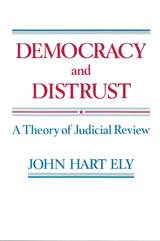
This powerfully argued appraisal of judicial review may change the face of American law. Written for layman and scholar alike, the book addresses one of the most important issues facing Americans today: within what guidelines shall the Supreme Court apply the strictures of the Constitution to the complexities of modern life?
Until now legal experts have proposed two basic approaches to the Constitution. The first, “interpretivism,” maintains that we should stick as closely as possible to what is explicit in the document itself. The second, predominant in recent academic theorizing, argues that the courts should be guided by what they see as the fundamental values of American society. John Hart Ely demonstrates that both of these approaches are inherently incomplete and inadequate. Democracy and Distrust sets forth a new and persuasive basis for determining the role of the Supreme Court today.
Ely’s proposal is centered on the view that the Court should devote itself to assuring majority governance while protecting minority rights. “The Constitution,” he writes, “has proceeded from the sensible assumption that an effective majority will not unreasonably threaten its own rights, and has sought to assure that such a majority not systematically treat others less well than it treats itself. It has done so by structuring decision processes at all levels in an attempt to ensure, first, that everyone’s interests will be represented when decisions are made, and second, that the application of those decisions will not be manipulated so as to reintroduce in practice the sort of discrimination that is impermissible in theory.”
Thus, Ely’s emphasis is on the procedural side of due process, on the preservation of governmental structure rather than on the recognition of elusive social values. At the same time, his approach is free of interpretivism’s rigidity because it is fully responsive to the changing wishes of a popular majority. Consequently, his book will have a profound impact on legal opinion at all levels—from experts in constitutional law, to lawyers with general practices, to concerned citizens watching the bewildering changes in American law.

In these two essays, one of America’s most honored writers fastens on the interrelation of American democracy and poetry and the concept of selfhood vital to each. “I really don’t want to make a noise like a pundit,” Mr. Warren declares, “What I do want to do is to return us—and myself most of all—to a scrutiny of our own experience of our own world.” Indeed, Democracy and Poetry offers one of the most pertinent and strongly personal meditations on our condition to have appeared in recent letters.
Our native “poetry,” that is, literature and art, in general, is a social document, is “diagnostic,” and has often been a corrosive criticism of our democracy, Mr. Warren argues. Persuasively, and movingly, he shows that all of “art” and all that goes into the making of democracy require a free and responsible self. Yet the American experience has been one of the decay of the notion of self. Our astounding success jeopardized what we promised to create—the free man. For a century and a half the conception of the self has been dwindling, separating itself from traditional values, moral identity, and a secure relation with community. Lonely heroes in a bankrupt civilization, then protest, despair, aimlessness, and violence, have marked our literature.
The anguish of Robert Penn Warren’s own poetic vision of art and democracy is soothed only by his belief that poetry—the making of art can nourish and at least do something toward the rescue of democracy; he shows how art can be- come a healer, can be “therapeutic.” In the face of disintegrative forces set loose in a business and technetronic society, it is poetry that affirms the notion of the self. It is a model of the organized self, an emblem of the struggle for the achieving self, and of the self in a community. More and more as our modern technetronic society races toward the abolition of the self, and diverges from a culture created to enhance the notion of selfhood, poetry becomes indispensable.
Compelling, resonant, memorable, Democracy and Poetry is a major testament not only to the vitality of poetry, but also to a faith in democracy.


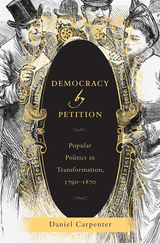
Winner of the James P. Hanlan Book Award
Winner of the J. David Greenstone Book Prize
Winner of the S. M. Lipset Best Book Award
This pioneering work of political history recovers the central and largely forgotten role that petitioning played in the formative years of North American democracy.
Known as the age of democracy, the nineteenth century witnessed the extension of the franchise and the rise of party politics. As Daniel Carpenter shows, however, democracy in America emerged not merely through elections and parties, but through the transformation of an ancient political tool: the petition. A statement of grievance accompanied by a list of signatures, the petition afforded women and men excluded from formal politics the chance to make their voices heard and to reshape the landscape of political possibility.
Democracy by Petition traces the explosion and expansion of petitioning across the North American continent. Indigenous tribes in Canada, free Blacks from Boston to the British West Indies, Irish canal workers in Indiana, and Hispanic settlers in territorial New Mexico all used petitions to make claims on those in power. Petitions facilitated the extension of suffrage, the decline of feudal land tenure, and advances in liberty for women, African Americans, and Indigenous peoples. Even where petitioners failed in their immediate aims, their campaigns advanced democracy by setting agendas, recruiting people into political causes, and fostering aspirations of equality. Far more than periodic elections, petitions provided an everyday current of communication between officeholders and the people.
The coming of democracy in America owes much to the unprecedented energy with which the petition was employed in the antebellum period. By uncovering this neglected yet vital strand of nineteenth-century life, Democracy by Petition will forever change how we understand our political history.
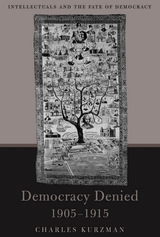
In the decade before World War I, a wave of democratic revolutions swept the globe, consuming more than a quarter of the world’s population. Revolution transformed Russia, Iran, the Ottoman Empire, Portugal, Mexico, and China. In each case, a pro-democracy movement unseated a long-standing autocracy with startling speed. The nascent democratic regime held elections, convened parliament, and allowed freedom of the press and freedom of association. But the new governments failed in many instances to uphold the rights and freedoms that they proclaimed. Coups d’état soon undermined the democratic experiments.
How do we account for these unexpected democracies, and for their rapid extinction? In Democracy Denied, Charles Kurzman proposes that the collective agent most directly responsible for democratization was the emerging class of modern intellectuals, a group that had gained a global identity and a near-messianic sense of mission following the Dreyfus Affair of 1898.
Each chapter of Democracy Denied focuses on a single angle of this story, covering all six cases by examining newspaper accounts, memoirs, and government reports. This thoroughly interdisciplinary treatment of the early-twentieth-century upheavals promises to reshape debates about the social origins of democracy, the causes of democratic collapse, the political roles of intellectuals, and the international flow of ideas.
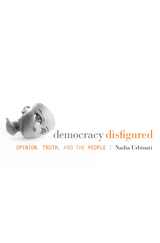
In Democracy Disfigured, Nadia Urbinati diagnoses the ills that beset the body politic in an age of hyper-partisanship and media monopolies and offers a spirited defense of the messy compromises and contentious outcomes that define democracy.
Urbinati identifies three types of democratic disfiguration: the unpolitical, the populist, and the plebiscitarian. Each undermines a crucial division that a well-functioning democracy must preserve: the wall separating the free forum of public opinion from the governmental institutions that enact the will of the people. Unpolitical democracy delegitimizes political opinion in favor of expertise. Populist democracy radically polarizes the public forum in which opinion is debated. And plebiscitary democracy overvalues the aesthetic and nonrational aspects of opinion. For Urbinati, democracy entails a permanent struggle to make visible the issues that citizens deem central to their lives. Opinion is thus a form of action as important as the mechanisms that organize votes and mobilize decisions.
Urbinati focuses less on the overt enemies of democracy than on those who pose as its friends: technocrats wedded to procedure, demagogues who make glib appeals to “the people,” and media operatives who, given their preference, would turn governance into a spectator sport and citizens into fans of opposing teams.

Athens in the fifth century B.C. offers a striking picture: the first democracy in history; the first empire created and ruled by a Greek city; and a flourishing of learning, philosophical thought, and visual and performing arts so rich as to leave a remarkable heritage for Western civilization. To what extent were these three parallel developments interrelated? An international group of fourteen scholars expert in different fields explores here the ways in which the fifth-century "cultural revolution" depended on Athenian democracy and the ways it was influenced by the fact that Athens was an imperial city.
The authors bring to this analysis their individual areas of expertise--in the visual arts, poetry and drama, philosophy, archaeology, religion, and social, economic, and political history--and a variety of theoretical approaches. The product of a colloquium at Harvard's Center for Hellenic Studies in Washington, D.C., Democracy, Empire, and the Arts in Fifth-Century Athens sheds new light on a much debated question that has wide implications. The book is illustrated and enriched by a comprehensive bibliography on the subject.
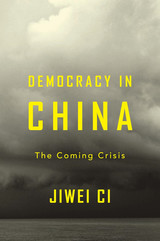
A respected Chinese political philosopher calls for the Communist Party to take the lead in moving China along the path to democracy before it is too late.
With Xi Jinping potentially set as president for life, China’s move toward political democracy may appear stalled. But Jiwei Ci argues that four decades of reform have created a mentality in the Chinese people that is just waiting for the political system to catch up, resulting in a disjunction between popular expectations and political realities. The inherent tensions in a largely democratic society without a democratic political system will trigger an unprecedented crisis of legitimacy, forcing the Communist Party to act or die.
Two crises loom for the government. First is the waning of the Communist Party’s revolutionary legacy, which the party itself sees as a grave threat. Second is the fragility of the next leadership transition. No amount of economic success will compensate for the party’s legitimacy deficit when the time comes. The only effective response, Ci argues, will be an orderly transition to democracy. To that end, the Chinese government needs to start priming its citizens for democracy, preparing them for new civil rights and civic responsibilities. Embracing this pragmatic role offers the Communist Party a chance to survive. Its leaders therefore have good reason to initiate democratic change.
Sure to challenge the Communist Party and stir debate, Democracy in China brings an original and important voice to an issue with far-reaching consequences for China and the world.
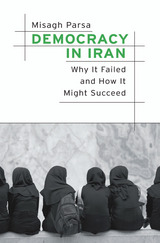
The Green Movement protests that erupted in Iran in 2009 amid allegations of election fraud shook the Islamic Republic to its core. For the first time in decades, the adoption of serious liberal reforms seemed possible. But the opportunity proved short-lived, leaving Iranian activists and intellectuals to debate whether any path to democracy remained open.
Offering a new framework for understanding democratization in developing countries governed by authoritarian regimes, Democracy in Iran is a penetrating, historically informed analysis of Iran’s current and future prospects for reform. Beginning with the Iranian Revolution of 1979, Misagh Parsa traces the evolution of Iran’s theocratic regime, examining the challenges the Islamic Republic has overcome as well as those that remain: inequalities in wealth and income, corruption and cronyism, and a “brain drain” of highly educated professionals eager to escape Iran’s repressive confines. The political fortunes of Iranian reformers seeking to address these problems have been uneven over a period that has seen hopes raised during a reformist administration, setbacks under Ahmadinejad, and the birth of the Green Movement. Although pro-democracy activists have made progress by fits and starts, they have few tangible reforms to show for their efforts.
In Parsa’s view, the outlook for Iranian democracy is stark. Gradual institutional reforms will not be sufficient for real change, nor can the government be reformed without fundamentally rethinking its commitment to the role of religion in politics and civic life. For Iran to democratize, the options are narrowing to a single path: another revolution.

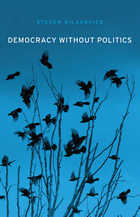
In Western democracies today, politics and politicians are held in contempt by the majority of citizens. Steven Bilakovics argues that this disdain of politics follows neither from the discontents of our liberal political system nor from the preoccupations of a consumer society. Rather, extending Tocqueville’s analysis of the modern democratic way of life, he traces the sources of political cynicism to democracy itself.
Democratic society’s defining openness—its promise of transcendent freedom and unlimited power—renders the everyday politics of argument and persuasion absurd by comparison. Persuasion is devalued relative to the norms of free-market competition and patriotic community, assertions of self-interest and self-expression take the place of arguing together, and political life is diminished by the absence of mediating talk. Bilakovics identifies this trend across the political landscape—in the clashing authenticities of the "culture war," the perennial pursuit of the political outsider to set things right again, the call for a postpartisan politics, rising demands on government alongside falling expectations of what government can do, and in a political rhetoric that is at once petty and hyperbolic. To reform democratic politics and ameliorate its pathologies, Bilakovics calls on us to overcome our anti-political prejudice and rethink robust democracy as the citizen's practice of persuading and being persuaded in turn.

Winner of the Goldsmith Book Prize, Shorenstein Center on Media, Politics and Public Policy at the Harvard Kennedy School of Government
Winner of the Tankard Book Award, Association for Education in Journalism and Mass Communication
Winner of the Frank Luther Mott–Kappa Tau Alpha Journalism & Mass Communication Research Award
In democratic societies, investigative journalism holds government and private institutions accountable to the public. From firings and resignations to changes in budgets and laws, the impact of this reporting can be significant—but so too are the costs. As newspapers confront shrinking subscriptions and advertising revenue, who is footing the bill for journalists to carry out their essential work? Democracy’s Detectives puts investigative journalism under a magnifying glass to clarify the challenges and opportunities facing news organizations today.
“Hamilton’s book presents a thoughtful and detailed case for the indispensability of investigative journalism—and just at the time when we needed it. Now more than ever, reporters can play an essential role as society’s watchdogs, working to expose corruption, greed, and injustice of the years to come. For this reason, Democracy’s Detectives should be taken as both a call to arms and a bracing reminder, for readers and journalists alike, of the importance of the profession.”
—Anya Schiffrin, The Nation
“A highly original look at exactly what the subtitle promises…Has this topic ever been more important than this year?”
—Tyler Cowen, Marginal Revolution
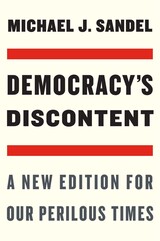
A renowned political philosopher updates his classic book on the American political tradition to address the perils democracy confronts today.
The 1990s were a heady time. The Cold War had ended, and America’s version of liberal capitalism seemed triumphant. And yet, amid the peace and prosperity, anxieties about the project of self-government could be glimpsed beneath the surface.
So argued Michael Sandel, in his influential and widely debated book Democracy’s Discontent, published in 1996. The market faith was eroding the common life. A rising sense of disempowerment was likely to provoke backlash, he wrote, from those who would “shore up borders, harden the distinction between insiders and outsiders, and promise a politics to ‘take back our culture and take back our country,’ to ‘restore our sovereignty’ with a vengeance.”
Now, a quarter century later, Sandel updates his classic work for an age when democracy’s discontent has hardened into a country divided against itself. In this new edition, he extends his account of America’s civic struggles from the 1990s to the present. He shows how Democrats and Republicans alike embraced a version of finance-driven globalization that created a society of winners and losers and fueled the toxic politics of our time.
In a work celebrated when first published as “a remarkable fusion of philosophical and historical scholarship” (Alan Brinkley), Sandel recalls moments in the American past when the country found ways to hold economic power to democratic account. To reinvigorate democracy, Sandel argues in a stirring new epilogue, we need to reconfigure the economy and empower citizens as participants in a shared public life.
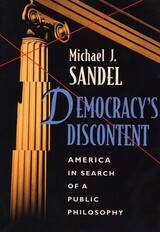
The defect, Sandel maintains, lies in the impoverished vision of citizenship and community shared by Democrats and Republicans alike. American politics has lost its civic voice, leaving both liberals and conservatives unable to inspire the sense of community and civic engagement that self-government requires.
In search of a public philosophy adequate to our time, Sandel ranges across the American political experience, recalling the arguments of Jefferson and Hamilton, Lincoln and Douglas, Holmes and Brandeis, FDR and Reagan. He relates epic debates over slavery and industrial capitalism to contemporary controversies over the welfare state, religion, abortion, gay rights, and hate speech. Democracy's Discontent provides a new interpretation of the American political and constitutional tradition that offers hope of rejuvenating our civic life.

In 1920, socialist leader Eugene V. Debs ran for president while serving a ten-year jail term for speaking against America’s role in World War I. Though many called Debs a traitor, others praised him as a prisoner of conscience, a martyr to the cause of free speech. Nearly a million Americans agreed, voting for a man whom the government had branded an enemy to his country.
In a beautifully crafted narrative, Ernest Freeberg shows that the campaign to send Debs from an Atlanta jailhouse to the White House was part of a wider national debate over the right to free speech in wartime. Debs was one of thousands of Americans arrested for speaking his mind during the war, while government censors were silencing dozens of newspapers and magazines. When peace was restored, however, a nationwide protest was unleashed against the government’s repression, demanding amnesty for Debs and his fellow political prisoners. Led by a coalition of the country’s most important intellectuals, writers, and labor leaders, this protest not only liberated Debs, but also launched the American Civil Liberties Union and changed the course of free speech in wartime.
The Debs case illuminates our own struggle to define the boundaries of permissible dissent as we continue to balance the right of free speech with the demands of national security. In this memorable story of democracy on trial, Freeberg excavates an extraordinary episode in the history of one of America’s most prized ideals.
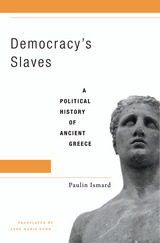
The ancient Greek statesman is a familiar figure in the Western political tradition. Less well known is the administrator who ran the state but who was himself a slave. Challenging the modern belief that democracy and bondage are incompatible, Paulin Ismard directs our attention to the cradle of Western democracy, ancient Athens, where the functioning of civic government depended crucially on highly skilled experts who were literally public servants—slaves owned by the city-state rather than by private citizens.
Known as dēmosioi, these public slaves filled a variety of important roles in Athenian society. They were court clerks, archivists, administrators, accountants, and policemen. Many possessed knowledge and skills beyond the attainments of average citizens, and they enjoyed privileges, such as the right to own property, that were denied to private slaves. In effect, dēmosioi were Western civilization’s first civil servants—though they carried out their duties in a condition of bound servitude.
Ismard detects a radical split between politics and administrative government at the heart of Athenian democracy. The city-state’s managerial caste freed citizens from the day-to-day responsibilities of running the state. By the same token, these public servants were unable to participate in the democratic process because they lacked the rights of full citizenship. By rendering the state’s administrators politically invisible, Athens warded off the specter of a government capable of turning against the citizens’ will. In a real sense, Ismard shows, Athenian citizens put the success of their democratic experiment in the hands of slaves.
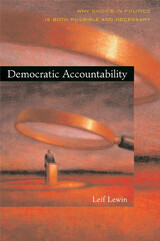
It is common for political leaders to claim they have no control over bad outcomes. Indeed, they often cite the arguments of political theorists and public intellectuals as to why: history rushes onward oblivious of human will; force and violence overcome political aims; globalization undermines the actions of national leaders; the bureaucracy sabotages their intentions; bad outcomes are often the unintended result of actions.
In Democratic Accountability, Leif Lewin examines these reasons and argues that they are unconvincing. He makes his case by describing and analyzing counterexamples in seven cases, including the prevention of a communist takeover in Europe after World War II, the European Union's preventing another European war, and Margaret Thatcher's taming of the bureaucracy in Britain. In a staunch defense of the possibility for meaningful and profound democratic decision making, Lewin finds that, in fact, not only do political leaders exert a good measure of control and therefore can be assigned responsibility, but the meaning of the functioning democracy is that the people hold their leaders accountable.
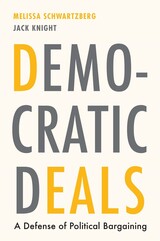
Two leading scholars of democracy make the case for political bargaining and define its proper limits.
Bargains—grand and prosaic—are a central fact of political life. The distribution of bargaining power affects the design of constitutions, the construction of party coalitions, legislative outcomes, judicial opinions, and much more. But can political bargaining be justified in theory? If it inevitably involves asymmetric power, is it anything more than the exercise of sublimated force, emerging from and reifying inequalities?
In Democratic Deals, Melissa Schwartzberg and Jack Knight defend bargaining against those who champion deliberation or compromise, showing that, under the right conditions and constraints, it can secure political equality and protect fundamental interests. The challenge, then, is to ensure that these conditions prevail. Drawing a sustained analogy to the private law of contracts—in particular, its concepts of duress and unconscionability—the authors articulate a set of procedural and substantive constraints on the bargaining process and analyze the circumstances under which unequal bargaining power might be justified in a democratic context. Institutions, Schwartzberg and Knight argue, can facilitate gains from exchange while placing meaningful limits on the exercise of unequal power.
Democratic Deals examines frameworks of just bargaining in a range of contexts—constitution-making and legislative politics, among judges and administrative agencies, across branches of government, and between the state and private actors in the course of plea deals. Bargaining is an ineradicable fact of political life. Schwartzberg and Knight show that it can also be essential for democracy.

The Italian Risorgimento, the movement for national independence and unification, is as significant to Italian history as the American Revolution is to United States history. Liberal supporters of constitutional monarchy triumphed in the political struggles of the Risorgimento, yet democratic activists and thinkers like Mazzini, Garibaldi, Pisacane, and Ferrari were major participants in those struggles.
By reconstructing the lives and political careers of 146 such activists and thinkers, Clara M. Lovett explores the democratic movement's impact on the development of modern Italy. She shows that three main principles—secularism, political egalitarianism, and a concern for social justice—sustained the movement throughout its development and became its legacy after the unification. By exploring the social context of the movement and the specific experiences of its members, she explains why the democrats failed to lead Italy's unification in 1860 and why some of them became Italy's early professional politicians.

Compared to the wealth of information available to us about classical tragedy and comedy, not much is known about the culture of pantomime, mime, and dance in late antiquity. Charges of obscenity and polemical anti-theater discourse have, at times, erased these popular performance traditions from the modern imagination. Demons and Dancers returns us to the times and places where those great ancient theaters were more than picturesque ruins dotting the Mediterranean landscape.
Ruth Webb fills this gap in our knowledge of the ancient world and provides us with a richly detailed look at social life in the late antique period through an investigation of its performance culture. The book focuses on the eastern empire, from Greece proper to modern-day Turkey and Egypt, between the second and sixth centuries CE. Using some of the tools provided by modern performance theory, this book explains how audiences interpreted the actions on stage, how the status of male and female performers shifted across time and place, how skilled the actors actually were (it was commonplace to dismiss these performers for their lack of skill), and what role spectacles involving spoken and sung words, as well as stylized gestures, had in Greco-Roman civic life.

Demons--whether in embodied form or as inward temptation--make vivid appearances in early Christian monastic literature. In this finely written study of demonology and Christian spirituality in fourth- and fifth-century Egypt, David Brakke examines how the conception of the monk as a holy and virtuous being was shaped by the combative encounter with demons.
Brakke studies the "making of the monk" from two perspectives. First, he describes the social and religious identities that monastic authors imagined for the demon-fighting monk: the new martyr who fights against the pagan gods, the gnostic who believes he knows both the tricks of the demons and the secrets of God, and the prophet who discerns the hidden presence of Satan even among good Christians. Then he employs recent theoretical ideas about gender and racial stereotyping to interpret accounts of demon encounters, especially those in which demons appear as the Other--as Ethiopians, as women, or as pagan gods.
Drawing on biographies of exceptional monks, collections of monastic sayings and stories, letters from ascetic teachers to their disciples, sermons, and community rules, Brakke crafts a compelling picture of the embattled religious celibate. Demons and the Making of the Monk is an insightful and innovative exploration of the development of Christian monasticism.
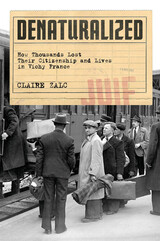
“In Denaturalized, Claire Zalc combines the precision of the scholar with the passion of a storyteller…This is a deftly written book. Zalc combines in an accessible style (smoothly translated by Catherine Porter) the stories of people trapped within a bureaucracy that was as obsessed, perhaps, with clearing files as with hunting Jews. In other words, Zalc reminds us how cruel the banality of indifference could be.”—Wall Street Journal
Winner of the Prix d’histoire de la justice
A leading historian radically revises our understanding of the fate of Jews under the Vichy regime.
Thousands of naturalized French men and women had their citizenship revoked by the Vichy government during the Second World War. Once denaturalized, these men and women, mostly Jews who were later sent to concentration camps, ceased being French on official records and walked off the pages of history. As a result, we have for decades severely underestimated the number of French Jews murdered by Nazis during the Holocaust. In Denaturalized, Claire Zalc unearths this tragic record and rewrites World War II history.
At its core, this is a detective story. How do we trace a citizen made alien by the law? How do we solve a murder when the body has vanished? Faced with the absence of straightforward evidence, Zalc turned to the original naturalization papers in order to uncover how denaturalization later occurred. She discovered that, in many cases, the very officials who granted citizenship to foreigners before 1940 were the ones who retracted it under Vichy rule.
The idea of citizenship has always existed alongside the threat of its revocation, and this is especially true for those who are naturalized citizens of a modern state. At a time when the status of millions of naturalized citizens in the United States and around the world is under greater scrutiny, Denaturalized turns our attention to the precariousness of the naturalized experience—the darkness that can befall those who suddenly find themselves legally cast out.

In his study of Brandenburg, Germany, Timothy Vogt directly challenges both the "antifascist" paradigm employed by East German historians and the "sovietization" interpretive model that has dominated western studies. He argues that Soviet denazification was neither an effective purge of society nor part of a methodical "sovietization" of the eastern zone. Instead, in a detailed study, denazification is pictured as a failure, which fell short of its goals and was eventually abandoned by the frustrated Soviet and German leadership.The case example of Brandenburg is an effective means of putting "flesh and blood" into the study and giving the reader insight into both broader developments and the human actors who propelled events. The result is an analysis that is based not simply on policymakers and their policies, but rather on how policy was continuously reformulated in response to developments on the local level.
The study encompasses significant aspects of contemporary European history: everyday life in Nazi Germany, Germany's postwar coming to terms with its Nazi past, the Cold War division of Germany, postwar Soviet policy, and the construction of a one-party communist system in Eastern Europe.

Winner of the Lionel Gelber Prize
National Book Critics Circle Award Finalist
An Economist Best Book of the Year | A Financial Times Book of the Year | A Wall Street Journal Book of the Year | A Washington Post Book of the Year | A Bloomberg News Book of the Year | An Esquire China Book of the Year | A Gates Notes Top Read of the Year
Perhaps no one in the twentieth century had a greater long-term impact on world history than Deng Xiaoping. And no scholar of contemporary East Asian history and culture is better qualified than Ezra Vogel to disentangle the many contradictions embodied in the life and legacy of China’s boldest strategist.
Once described by Mao Zedong as a “needle inside a ball of cotton,” Deng was the pragmatic yet disciplined driving force behind China’s radical transformation in the late twentieth century. He confronted the damage wrought by the Cultural Revolution, dissolved Mao’s cult of personality, and loosened the economic and social policies that had stunted China’s growth. Obsessed with modernization and technology, Deng opened trade relations with the West, which lifted hundreds of millions of his countrymen out of poverty. Yet at the same time he answered to his authoritarian roots, most notably when he ordered the crackdown in June 1989 at Tiananmen Square.
Deng’s youthful commitment to the Communist Party was cemented in Paris in the early 1920s, among a group of Chinese student-workers that also included Zhou Enlai. Deng returned home in 1927 to join the Chinese Revolution on the ground floor. In the fifty years of his tumultuous rise to power, he endured accusations, purges, and even exile before becoming China’s preeminent leader from 1978 to 1989 and again in 1992. When he reached the top, Deng saw an opportunity to creatively destroy much of the economic system he had helped build for five decades as a loyal follower of Mao—and he did not hesitate.


You’ve argued politics with your aunt since high school, but failing eyesight now prevents her from keeping current with the newspaper. Your mother fractured her hip last year and is confined to a wheelchair. Your father has Alzheimer’s and only occasionally recognizes you. Someday, as Muriel Gillick points out in this important yet unsettling book, you too will be old. And no matter what vitamin regimen you’re on now, you will likely one day find yourself sick or frail. How do you prepare? What will you need?
With passion and compassion, Gillick chronicles the stories of elders who have struggled with housing options, with medical care decisions, and with finding meaning in life. Skillfully incorporating insights from medicine, health policy, and economics, she lays out action plans for individuals and for communities. In addition to doing all we can to maintain our health, we must vote and organize—for housing choices that consider autonomy as well as safety, for employment that utilizes the skills and wisdom of the elderly, and for better management of disability and chronic disease.
Most provocatively, Gillick argues against desperate attempts to cure the incurable. Care should focus on quality of life, not whether it can be prolonged at any cost. “A good old age,” writes Gillick, “is within our grasp.” But we must reach in the right direction.



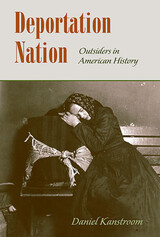
The danger of deportation hangs over the head of virtually every noncitizen in the United States. In the complexities and inconsistencies of immigration law, one can find a reason to deport almost any noncitizen at almost any time. In recent years, the system has been used with unprecedented vigor against millions of deportees.
We are a nation of immigrants--but which ones do we want, and what do we do with those that we don't? These questions have troubled American law and politics since colonial times.
Deportation Nation is a chilling history of communal self-idealization and self-protection. The post-Revolutionary Alien and Sedition Laws, the Fugitive Slave laws, the Indian "removals," the Chinese Exclusion Act, the Palmer Raids, the internment of the Japanese Americans--all sought to remove those whose origins suggested they could never become "true" Americans. And for more than a century, millions of Mexicans have conveniently served as cheap labor, crossing a border that was not official until the early twentieth century and being sent back across it when they became a burden.
By illuminating the shadowy corners of American history, Daniel Kanstroom shows that deportation has long been a legal tool to control immigrants' lives and is used with increasing crudeness in a globalized but xenophobic world.


What does it mean for scientists to truly understand, rather than to merely describe, how the world works? Michael Strevens proposes a novel theory of scientific explanation and understanding that overhauls and augments the familiar causal approach to explanation. What is replaced is the test for explanatorily relevant causal information: Strevens discards the usual criterion of counterfactual dependence in favor of a criterion that turns on a process of progressive abstraction away from a fully detailed, physical causal story. The augmentations include the introduction of a new, non-causal explanatory relevance relation—entanglement—and an independent theory of the role of black-boxing and functional specification in explanation.
The abstraction-centered notion of difference-making leads to a rich causal treatment of many aspects of explanation that have been either ignored or handled inadequately by earlier causal approaches, including the explanation of laws and other regularities, with particular attention to the explanation of physically contingent high-level laws, idealization in explanation, and probabilistic explanation in deterministic systems, as in statistical physics, evolutionary biology, and medicine.
The result is an account of explanation that has especially significant consequences for the higher-level sciences: biology, psychology, economics, and other social sciences.

The Rigveda is the oldest Indian and one of the oldest Indo-European texts. It is a collection of 1,028 hymns addressed to the gods, composed in highly poetic and notoriously difficult Archaic Sanskrit. Medieval Indian commentaries and especially the modern Western scholarship of the past 150 years have increasingly shed more light on its poetry, religion, and ritual as well as on its contemporary meaning.
The Rigveda has been translated in scholarly fashion only once during the twentieth century, and that was into German in 1951 by K. F. Geldner and published in three separate volumes of Harvard Oriental Studies, numbers 33, 34, and 35. Renou's French and Elizarenkova's Russian translations closely follow Geldner's. Geldner's volumes have long been out of print; they are reprinted here in one useful reference volume.





Descartes's concept of the mind, as distinct from the body with which it forms a union, set the agenda for much of Western philosophy's subsequent reflection on human nature and thought. This is the first book to give an analysis of Descartes's pivotal concept that deals with all the functions of the mind, cognitive as well as volitional, theoretical as well as practical and moral. Focusing on Descartes's view of the mind as intimately united to and intermingled with the body, and exploring its implications for his philosophy of mind and moral psychology, Lilli Alanen argues that the epistemological and methodological consequences of this view have been largely misconstrued in the modern debate.
Informed by both the French tradition of Descartes scholarship and recent Anglo-American research, Alanen's book combines historical-contextual analysis with a philosophical problem-oriented approach. It seeks to relate Descartes's views on mind and intentionality both to contemporary debates and to the problems Descartes confronted in their historical context. By drawing out the historical antecedents and the intellectual evolution of Descartes's thinking about the mind, the book shows how his emphasis on the embodiment of the mind has implications far more complex and interesting than the usual dualist account suggests.
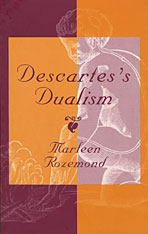
Descartes, an acknowledged founder of modern philosophy, is identified particularly with mind-body dualism--the view that the mind is an incorporeal entity. But this view was not entirely original with Descartes, and in fact to a significant extent it was widely accepted by the Aristotelian scholastics who preceded him, although they entertained a different conception of the nature of mind, body, and the relationship between them. In her first book, Marleen Rozemond explicates Descartes's aim to provide a metaphysics that would accommodate mechanistic science and supplant scholasticism.
Her approach includes discussion of central differences from and similarities to the scholastics and how these discriminations affected Descartes's defense of the incorporeity of the mind and the mechanistic conception of body. Confronting the question of how, in his view, mind and body are united, she examines his defense of this union on the basis of sensation. In the course of her argument, she focuses on a few of the scholastics to whom Descartes referred in his own writings: Thomas Aquinas, Francisco Suárez, Eustachius of St. Paul, and the Jesuits of Coimbra. This new systematic account of Descartes's dualism amply demonstrates why he still deserves serious study and respect for his extraordinary philosophical achievements.



Antiquity’s original travel guide.
Pausanias, born probably in Lydia in Asia Minor, was a Greek of the second century AD, about 120–180, who traveled widely not only in Asia Minor, Palestine, Egypt, and North Africa, but also in Greece and in Italy, including Rome. He left a description of Greece in ten books, which is like a topographical guidebook or tour of Attica, the Peloponnese, and central Greece, filled out with historical accounts and events and digressions on facts and wonders of nature. His chief interest was in monuments of art and architecture, especially the most famous of them; the accuracy of his descriptions is proved by surviving remains.
The Loeb Classical Library edition of Pausanias is in five volumes; the fifth volume contains maps, plans, illustrations, and a general index.

Antiquity’s original travel guide.
Pausanias, born probably in Lydia in Asia Minor, was a Greek of the second century AD, about 120–180, who traveled widely not only in Asia Minor, Palestine, Egypt, and North Africa, but also in Greece and in Italy, including Rome. He left a description of Greece in ten books, which is like a topographical guidebook or tour of Attica, the Peloponnese, and central Greece, filled out with historical accounts and events and digressions on facts and wonders of nature. His chief interest was in monuments of art and architecture, especially the most famous of them; the accuracy of his descriptions is proved by surviving remains.
The Loeb Classical Library edition of Pausanias is in five volumes; the fifth volume contains maps, plans, illustrations, and a general index.

Antiquity’s original travel guide.
Pausanias, born probably in Lydia in Asia Minor, was a Greek of the second century AD, about 120–180, who traveled widely not only in Asia Minor, Palestine, Egypt, and North Africa, but also in Greece and in Italy, including Rome. He left a description of Greece in ten books, which is like a topographical guidebook or tour of Attica, the Peloponnese, and central Greece, filled out with historical accounts and events and digressions on facts and wonders of nature. His chief interest was in monuments of art and architecture, especially the most famous of them; the accuracy of his descriptions is proved by surviving remains.
The Loeb Classical Library edition of Pausanias is in five volumes; the fifth volume contains maps, plans, illustrations, and a general index.

Antiquity’s original travel guide.
Pausanias, born probably in Lydia in Asia Minor, was a Greek of the second century AD, about 120–180, who traveled widely not only in Asia Minor, Palestine, Egypt, and North Africa, but also in Greece and in Italy, including Rome. He left a description of Greece in ten books, which is like a topographical guidebook or tour of Attica, the Peloponnese, and central Greece, filled out with historical accounts and events and digressions on facts and wonders of nature. His chief interest was in monuments of art and architecture, especially the most famous of them; the accuracy of his descriptions is proved by surviving remains.
The Loeb Classical Library edition of Pausanias is in five volumes; the fifth volume contains maps, plans, illustrations, and a general index.

Antiquity’s original travel guide.
Pausanias, born probably in Lydia in Asia Minor, was a Greek of the second century AD, about 120–180, who traveled widely not only in Asia Minor, Palestine, Egypt, and North Africa, but also in Greece and in Italy, including Rome. He left a description of Greece in ten books, which is like a topographical guidebook or tour of Attica, the Peloponnese, and central Greece, filled out with historical accounts and events and digressions on facts and wonders of nature. His chief interest was in monuments of art and architecture, especially the most famous of them; the accuracy of his descriptions is proved by surviving remains.
The Loeb Classical Library edition of Pausanias is in five volumes; the fifth volume contains maps, plans, illustrations, and a general index.

For most of us the word "desert" conjures up images of barren wasteland, vast, dry stretches inimical to life. But for a great array of creatures, perhaps even more plentiful than those who inhabit tropical rainforests, the desert is a haven and a home. Travel with Michael Mares into the deserts of Argentina, Iran, Egypt, and the American Southwest and you will encounter a rich and memorable variety of these small, tenacious animals, many of them first discovered by Mares in areas never before studied. Accompanying Mares on his forays into these hostile habitats, we observe the remarkable behavioral, physiological, and ecological adaptations that have allowed such little-known species of rodents, bats, and other small mammals to persist in an arid world. At the same time, we see firsthand the perils and pitfalls that await biologists who venture into the field to investigate new habitats, discover new species, and add to our knowledge of the diversity of life.
Filled with the seductions and trials that such adventures entail, A Desert Calling affords an intimate understanding of the biologist's vocation. As he astonishes us with the range and variety of knowledge to be acquired through the determined investigation of little-known habitats, Mares opens a window on his own uncommon life, as well as on the uncommon life of the remote and mysterious corners of our planet.
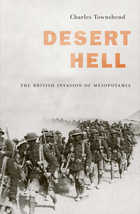
The U.S.-led conquest and occupation of Iraq have kept that troubled country in international headlines since 2003. For America’s major Coalition ally, Great Britain, however, this latest incursion into the region played out against the dramatic backdrop of imperial history: Britain’s fateful invasion of Mesopotamia in 1914 and the creation of a new nation from the shards of war.
The objectives of the expedition sent by the British Government of India were primarily strategic: to protect the Raj, impress Britain’s military power upon Arabs chafing under Ottoman rule, and secure the Persian oil supply. But over the course of the Mesopotamian campaign, these goals expanded, and by the end of World War I Britain was committed to controlling the entire region from Suez to India. The conquest of Mesopotamia and the creation of Iraq were the central acts in this boldly opportunistic bid for supremacy. Charles Townshend provides a compelling account of the atrocious, unnecessary suffering inflicted on the expedition’s mostly Indian troops, which set the pattern for Britain’s follow-up campaigns in Iraq and Afghanistan over the next seven years. He chronicles the overconfidence, incompetence, and dangerously vague policy that distorted the mission, and examines the steps by which an initially cautious strategic operation led to imperial expansion on a vast scale.
Desert Hell is a cautionary tale for makers of national policy. And for those with an interest in imperial history, it raises searching questions about Britain’s quest for global power and the indelible consequences of those actions for the Middle East and the world.

Oil and water, and the science and technology used to harness them, have long been at the heart of political authority in Saudi Arabia. Oil’s abundance, and the fantastic wealth it generated, has been a keystone in the political primacy of the kingdom’s ruling family. The other bedrock element was water, whose importance was measured by its dearth. Over much of the twentieth century, it was through efforts to control and manage oil and water that the modern state of Saudi Arabia emerged.
The central government’s power over water, space, and people expanded steadily over time, enabled by increasing oil revenues. The operations of the Arabian American Oil Company proved critical to expansion and to achieving power over the environment. Political authority in Saudi Arabia took shape through global networks of oil, science, and expertise. And, where oil and water were central to the forging of Saudi authoritarianism, they were also instrumental in shaping politics on the ground. Nowhere was the impact more profound than in the oil-rich Eastern Province, where the politics of oil and water led to a yearning for national belonging and to calls for revolution.
Saudi Arabia is traditionally viewed through the lenses of Islam, tribe, and the economics of oil. Desert Kingdom now provides an alternative history of environmental power and the making of the modern Saudi state. It demonstrates how vital the exploitation of nature and the roles of science and global experts were to the consolidation of political authority in the desert.

Winner of the Association of American Publishers PROSE Award for Excellence in Biological and Life Sciences
A world-renowned researcher of animal behavior reveals the extraordinary orienteering skills of desert ants, offering a thrilling account of the sophisticated ways insects function in their natural environments.
Cataglyphis desert ants are agile ultrarunners who can tolerate near-lethal temperatures when they forage in the hot midday sun. But it is their remarkable navigational abilities that make these ants so fascinating to study. Whether in the Sahara or its ecological equivalents in the Namib Desert and Australian Outback, the Cataglyphis navigators can set out foraging across vast expanses of desert terrain in search of prey, and then find the shortest way home. For almost half a century, Rüdiger Wehner and his collaborators have devised elegant experiments to unmask how they do it.
Through a lively and lucid narrative, Desert Navigator offers a firsthand look at the extraordinary navigational skills of these charismatic desert dwellers and the experiments that revealed how they strategize and solve complex problems. Wehner and his team discovered that these insect navigators use visual cues in the sky that humans are unable to see, the Earth’s magnetic field, wind direction, a step counter, and panoramic “snapshots” of landmarks, among other resources. The ants combine all of this information to steer an optimal course. At any given time during their long journey, they know exactly where to go. It is no wonder these nimble and versatile creatures have become models in the study of animal navigation.
Desert Navigator brings to light the marvelous capacity and complexity found in these remarkable insects and shows us how mini brains can solve mega tasks.

Following a vast expansion in the twentieth century, government is beginning to creak at the joints under its enormous weight. The signs are clear: a bloated civil service, low approval ratings for Congress and the President, increasing federal-state conflict, rampant distrust of politicians and government officials, record state deficits, and major unrest among public employees.
In this compact, clearly written book, the noted legal scholar Richard Epstein advocates a much smaller federal government, arguing that our over-regulated state allows too much discretion on the part of regulators, which results in arbitrary, unfair decisions, rent-seeking, and other abuses. Epstein bases his classical liberalism on the twin pillars of the rule of law and of private contracts and property rights—an overarching structure that allows private property to keep its form regardless of changes in population, tastes, technology, and wealth. This structure also makes possible a restrained public administration to implement limited objectives. Government continues to play a key role as night-watchman, but with the added flexibility in revenues and expenditures to attend to national defense and infrastructure formation.
Although no legal system can eliminate the need for discretion in the management of both private and public affairs, predictable laws can cabin the zone of discretion and permit arbitrary decisions to be challenged. Joining a set of strong property rights with sound but limited public administration could strengthen the rule of law, with its virtues of neutrality, generality, clarity, consistency, and forward-lookingness, and reverse the contempt and cynicism that have overcome us.



With the role of the landscape architect increasing as it is in importance, this first comprehensive survey of the art and practice of landscape architecture fills a great need.
Norman T. Newton has included over 400 illustrations in his book, which conveys a basic understanding of the aims and scope of landscape architecture and offers visual analyses of major historic works, each in the context of its own time.
The first third of the study is concerned with landscape architecture in the Western world, mainly Europe, from ancient times to the mid-nineteenth century. But the major part of the work is devoted to the development of landscape architecture in the century that has passed since it acquired the status of a profession and an independent discipline.
Concentrating primarily on the United States, Mr. Newton reviews his subject from its beginnings in colonial days to the work of Olmsted, Vaux, Cleveland, Weidenmann, Eliot, Platt, and the founders of the American Society of Landscape Architects. He discusses the Columbian Exposition of 1893, the "City Beautiful" movement and the growth of city planning, the Country Place Era, town planning in England and America, American national and state parks, parkways, urban open spaces, and recent variations in professional practice.
Mr. Newton concludes his book with a timely discussion of the vital role that landscape architecture plays in the conservation of natural resources and in protection of the environment.

The vision of a garden shared peacefully by humans and animals is a familiar, but elusive, landscape trope. Whether threatened by habitat destruction or climate change, displaced by urbanization or invasive species, poisoned by industrial toxins, or hunted to extinction, many wild animals have failed to thrive in the company of people. There is growing scientific consensus that we are in the midst of the sixth great extinction in earth history—and the first caused by human activities.
What agency can landscape architects and garden designers have in conserving or restoring wildlife diversity? Designing Wildlife Habitats gathers essays by designers, scientists, and historians to explore how they might better collaborate to promote zoological biodiversity and how scientific ambitions might be expressed in culturally significant and historically informed design. Established conservation practices within ecology have begun to shape landscape architecture, and current initiatives in ecosystem services, restoration ecology, and designer-generated ecological experiments provide an enlarged role for landscape architects in the creation of productive habitats. Design has become increasingly instrumental to both the appearance and the ecological function of landscapes.


It is a story that has gone down in the annals of American art history: a New Yorker visiting upstate Hoosick Falls is entranced by four pictures hanging in the window of a drugstore. Investigating further, he learns they are the handiwork of a 78-year-old widow. Thus begins the rise to fame of Grandma Moses—farmwife, painter, and unlikely celebrity.
In this book Karal Ann Marling, distinguished observer of American visual culture, looks at Grandma Moses as a cultural phenomenon of the postwar period and explores the meaning of her subject matter—and her astonishing fame. What did the “Greatest Generation” see in her simple renderings of people, young and old, tapping maple trees for syrup, making apple butter, gliding across snowy fields on sleighs? Why did Bob Hope, Irving Berlin, and Harry Truman all love her—and the art czars of New York openly despise her? Through the flood of Moses merchandise—splashed across Christmas cards, dishware, yard goods, and gewgaws of every kind—Marling traces the resonances that these “primitive” images struck in an America awkwardly adjusting to a new era of technology, suburbia, and Cold War tensions.
Between the cultural ephemera, folklore, song, and history embedded in Moses’s paintings and the potent advertising shorthand for Americana that her images rapidly became, this book reveals the widespread longing for the memories, comforts, and small victories of a mythic, intimate American past tapped by the phenomenon—in art and commerce alike—of Grandma Moses.

In this study of desire in Late Imperial China, Martin W. Huang argues that the development of traditional Chinese fiction as a narrative genre was closely related to changes in conceptions of the fundamental nature of desire. He further suggests that the rise of vernacular fiction during the late Ming dynasty should be studied in the context of contemporary debates on desire, along with the new and complex views that emerged from those debates.
Desire and Fictional Narrative in Late Imperial China shows that the obsession of authors with individual desire is an essential quality that defines traditional Chinese fiction as a narrative genre. Thus the maturation of the genre can best be appreciated in terms of its increasingly sophisticated exploration of the phenomenon of desire.

Throughout his life, John Donne was well acquainted with the consequences of desire. He wanted a courtly career badly enough to renounce the Catholicism of his childhood. Later, he wanted a woman badly enough to gamble that career for her sake; he lost, but found a new calling in the Anglican Church. There he pursued philosophical and theological questions with an intensity to match his former social ambitions, and was not above addressing God Himself in tones of "immoderate desire." Death became his ultimate object of passionate attention; and ever since that final consummation, critics have argued over the nature and import of Donne's desires, while simultaneously (if not always self-consciously) revealing a great deal about their own.
Saunders explores this dialectic of desire, re-evaluating both Donne's poetry and the complex responses it has inspired, from his earliest readers to his recent professional critics. In the process, Saunders considers an extraordinary range of topics, including the technology of the book, prosodic theory, the problem of misogyny, the history of sexuality, and even the purpose of criticism itself; remarkably, he does so while keeping Donne's poetry in focus at all times.
Witty, erudite, theoretically engaged, but intensely readable, this study takes into account recent developments in the fields of historicism, feminism, queer theory, and postmodern psychoanalysis, while offering dazzling close readings of many of Donne's most famous poems.

A Telegraph Book of the Year
A Washington Post Notable Work
A Times Book of the Year
A Hughes Award Finalist
“An indisputable masterpiece…comprehensive, fascinating, and persuasive.”
—Wall Street Journal
“Brimming with wisdom and brio, this masterful work spans the history of psychiatry. Exceedingly well-researched, wide-ranging, provocative in its conclusions, and magically compact, it is riveting from start to finish. Mark my words, Desperate Remedies will soon be a classic.”
—Susannah Cahalan, author of Brain on Fire
“Compulsively readable…Scull has joined his wide-ranging reporting and research with a humane perspective on matters that many of us continue to look away from.”
—Daphne Merkin, The Atlantic
"Scull's fascinating and enraging book is the story of the quacks and opportunists who have claimed to offer cures for mental illness...Madness remains the most fascinating—arguably the defining—aspect of Homo sapiens."
—Sebastian Faulks, Sunday Times
“I would recommend this fascinating, alarming, and alerting book to anybody. For anyone referred to a psychiatrist it is surely essential.”
—The Spectator
For more than two hundred years disturbances of the mind have been studied and treated by the medical profession. Mental illness, some insist, is a disease like any other, from which one can be cured. But is this true?
From the birth of the asylum to the latest drug trials, Desperate Remedies brings together a galaxy of mind doctors working in and out of institutional settings: psychologists and psychoanalysts, neuroscientists and cognitive behavioral therapists, as well as patients and their families desperate for relief. Surprising, disturbing, and compelling, this passionate account of America’s long battle with mental illness challenges us to revisit some of our deepest assumptions and to confront the epidemic of mental illness so visible all around us.

Men and women remain unequal in the United States, but in this provocative book, Robert Max Jackson demonstrates that gender inequality is irrevocably crumbling. Destined for Equality, the first integrated analysis of gender inequality's modern decline, tells the story of that progressive movement toward equality over the past two centuries in America, showing that women's status has risen consistently and continuously.
Jackson asserts that women's rising status has been due largely to the emergence of modern political and economic organizations, which have transformed institutional priorities concerning gender. Although individual politicians and businessmen generally believed women should remain in their traditional roles, Jackson shows that it was simply not in the interests of modern enterprise and government to foster inequality. The search for profits, votes, organizational rationality, and stability all favored a gender-neutral approach that improved women's status. The inherent gender impartiality of organizational interests won out over the prejudiced preferences of the men who ran them.
As economic power migrated into large-scale organizations inherently indifferent to gender distinctions, the patriarchal model lost its social and cultural sway, and women's continual efforts to rise in the world became steadily more successful. Total gender equality will eventually prevail; the only questions remaining are what it will look like, and how and when it will arrive.

Historians have long been perplexed by the complete disappearance of the medieval Chinese aristocracy by the tenth century—the “great clans” that had dominated China for centuries. In this book, Nicolas Tackett resolves the enigma of their disappearance, using new, digital methodologies to analyze a dazzling array of sources.
Tackett systematically mines thousands of funerary biographies excavated in recent decades—most of them never before examined by scholars—while taking full advantage of the explanatory power of Geographic Information System (GIS) methods and social network analysis. Tackett supplements these analyses with extensive anecdotes culled from epitaphs, prose literature, and poetry, bringing to life women and men who lived a millennium in the past. The Destruction of the Medieval Chinese Aristocracy demonstrates that the great Tang aristocratic families adapted to the social, economic, and institutional transformations of the seventh and eighth centuries far more successfully than previously believed. Their political influence collapsed only after a large number were killed during three decades of extreme violence following Huang Chao’s sack of the capital cities in 880 CE.

In Detective Fiction and the Rise of the Japanese Novel, Satoru Saito sheds light on the deep structural and conceptual similarities between detective fiction and the novel in prewar Japan. Arguing that the interactions between the two genres were not marginal occurrences but instead critical moments of literary engagement, Saito demonstrates how detective fiction provided Japanese authors with the necessary frameworks through which to examine and critique the nature and implications of Japan’s literary formations and its modernizing society.
Through a series of close readings of literary texts by canonical writers of Japanese literature and detective fiction, including Tsubouchi Shoyo, Natsume Soseki, Shimazaki Toson, Sato Haruo, Kuroiwa Ruiko, and Edogawa Ranpo, Saito explores how the detective story functioned to mediate the tenuous relationships between literature and society as well as between subject and authority that made literary texts significant as political acts. By foregrounding the often implicit and contradictory strategies of literary texts—choice of narrative forms, symbolic mappings, and intertextual evocations among others—this study examines in detail the intricate interactions between detective fiction and the novel that shaped the development of modern Japanese literature.

Japan’s “Christian Century” began in 1549 with the arrival of Jesuit missionaries led by Saint Francis Xavier, and ended in 1639 when the Tokugawa regime issued the final Sakoku Edict prohibiting all traffic with Catholic lands. “Sakoku”—national isolation—would for more than two centuries be the sum total of the regime’s approach to foreign affairs. This policy was accompanied by the persecution of Christians inside Japan, a course of action for which the missionaries and their zealots were in part responsible because of their dogmatic orthodoxy. The Christians insisted that “Deus” was owed supreme loyalty, while the Tokugawa critics insisted on the prior importance of performing one’s role within the secular order, and denounced the subversive doctrine whose First Commandment seemed to permit rebellion against the state.
In discussing the collision of ideas and historical processes, George Elison explores the attitudes and procedures of the missionaries, describes the entanglements in politics that contributed heavily to their doom, and shows the many levels of the Japanese response to Christianity. Central to his book are translations of four seventeenth-century, anti-Christian polemical tracts.

Download PDF of corrected version of Chapter 2The intrinsic links between economics and human rights has led some scholars and practitioners to affirm that if strategies of economic development and policies to implement human rights are united, they will reinforce one another and improve the human condition.
This book draws on the papers presented at the Nobel Symposium on The Right to Development and Human Rights in Development. Opening with an essay by Nobel Laureate Amartya Sen, the book contains chapters by experts in the fields of philosophy, economics, international law, and international relations on the conceptual underpinnings of development as a human right, the national dimensions of this right, and the role of international institutions. The contributors explore the meaning and practical implications of human rights-based approaches to economic development and ask what this relationship may add to our understanding and thinking about human and global development.

The field of development is subject to shifts in paradigms, and it is important to examine systematically how these are realized in actual practice. Two currently favored approaches are participation and indigenous knowledge. In this volume's collected papers, development researchers and practitioners share their ideas and experience on the different forms taken by participation and knowledge, not limited to "indigenous" knowledge, in the practice of development. The "development encounters" they describe took place in sites ranging from villages in the Amazon, India, and southern Africa to research laboratories and corporate boardrooms in central Africa, Latin America, and the United States.
This timely and grounded account of participation and knowledge in the front lines will be of interest to a range of practitioners, analysts, and students of development.

P. T. Bauer is a pioneer: from the outset his studies and reflections about economic development led him to conclusions that diverge from the mainstream. The Development Frontier illustrates his characteristic approach, in which economic analysis is allied with careful observation of the economic scene and economic processes in the less developed world. The book is further enriched by his understanding of the interplay between social and political factors and forces conventionally regarded as falling within the purview of economics.
One of Bauer's central themes is the crucial importance of traders in transforming subsistence and near-subsistence economies into exchange economies. In contrast to the conventional view that traders are parasitic, Bauer views them as productive: they encourage new wants, convey information about new opportunities, and help producers take advantage of these opportunities. Other major topics include internal trade in less developed countries, occupational distribution and economic advance, Third World debt, price and income stabilization of primary producers, and official resource transfers (foreign aid).
Bauer presents arresting insights and graphic illustrations. He challenges the preconceptions and attitudes of nonspecialists and specialists alike, whether he is writing about the role of traders, the population explosion, Hong Kong, or the views of the late Sir John Hicks on economic history.

READERS
Browse our collection.
PUBLISHERS
See BiblioVault's publisher services.
STUDENT SERVICES
Files for college accessibility offices.
UChicago Accessibility Resources
home | accessibility | search | about | contact us
BiblioVault ® 2001 - 2024
The University of Chicago Press









